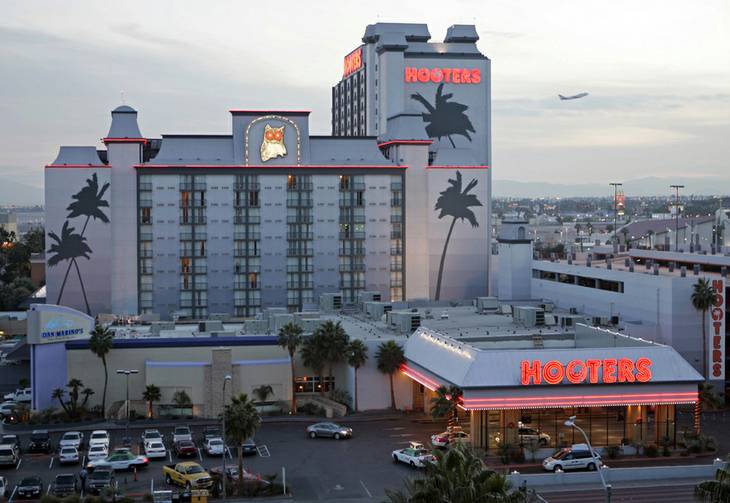The Las Vegas Hooters casino bankruptcy is shaping up to be contentious, with the property’s main creditor already suggesting executives there are overpaid.
Hooters, unable to service its $162 million-plus in debt, filed for Chapter 11 bankruptcy protection Monday to block a foreclosure by debt holder Canpartners Realty Holding Company IV.
Canpartners is an affiliate of Canyon Capital Realty Advisors of Los Angeles, a $20 billion investment house.
Attorneys for Canpartners made their first public comments on the Hooters bankruptcy Wednesday – and they weren’t favorable about Hooters management.
Canpartners noted in a court filing that Deborah Pierce, the chief financial officer of Hooters casino’s parent company, 155 East Tropicana LLC, in early July had an annual base salary of $191,406 – not counting potential bonuses.
"Sometime last month, on the eve of bankruptcy, Ms. Pierce’s base salary was increased by 61 percent (to $307,406)," Canpartners said in the brief.
Canpartners noted that Gary Gregg, chief operating officer of the casino company, receives a base salary of $300,000; Michael Hessling, president, receives a base salary of $275,000; and Neil Kiefer, CEO, receives a $100,000 annual salary.
Canpartners charged that while "hotel and casino revenues have steadily decreased since 2007, the salaries of executive level employees have dramatically increased during this same timeframe."
"Based on the company’s financial statements previously provided to Canpartners by Ms. Pierce, net revenue declined by 34 percent from $66.5 million to $43.7 million from 2007 to 2010, respectively," Canpartners’ filing said. "During that same time period of revenue decline, executive salaries increased 8 percent whereas salaries for all departments excluding executives declined by 26 percent and full-time employees were reduced by 37 percent from 966 FTEs to 605 FTEs."
"While Canpartners consents to the payment of senior management’s existing salaries (even those recently modified shortly before the bankruptcy) on an interim basis, Canpartners reserves all of its rights to object to the executive level and board member compensation at a further hearing," said the filing by Canpartners attorneys with the Los Angeles law firm Loeb & Loeb LLP and the Las Vegas firm Shea & Carlyon Ltd.
Wednesday’s court filing was likely just the first salvo in a battle over how Canpartners can protect its collateral in the hotel-casino, including the property’s cash in various accounts.
Hooters has said Canpartners acquired 98 percent of its bond debt at a substantial discount, but it’s unknown how much Canpartners actually paid for it. Hooters has said it tried to negotiate a solution to avoid the bankruptcy, but was unable to reach an agreement with Canpartners.
Canpartners said in its filing it’s the casino’s sole lender under a $14.5 million first lien credit facility and that the casino’s senior secured note (bond) obligations total $165 million.
"The obligations are secured by first and second priority security interests in and liens on substantially all of debtors’ assets," Canpartners said in its filing.
That would indicate the property is substantially upside down on its debt, as the casino’s initial bankruptcy filing estimated assets totaled no more than $50 million.
The Clark County Assessor lists the taxable value of the property at just over $22 million. Its actual market value will likely be determined through the bankruptcy process.
Attorneys for U.S. Bank, trustee for the bondholders, on Thursday joined Canpartners in expressing concern about the Hooters casino salaries.
"Certain facts regarding the payment of salaries bare further investigation," said a filing by U.S. Bank, which is represented by attorneys in multiple offices of the law firms Ballard Spahr LLP and the firm Dorsey & Whitney LLP of Minneapolis.
U.S. Bankruptcy Judge Bruce Markell in Las Vegas on Thursday approved the Hooters casino’s routine "first day" bankruptcy motions on issues like its requests to continue paying employees and vendors as usual. He also gave the casino interim approval to continue using creditors' cash collateral totaling nearly $9 million.
But he acknowledged the creditors’ concerns about the salaries and ordered 155 East Tropicana to file – under seal – with the court a list of the top 10 paid executives and their salaries. That way, the information will be available to him should creditors press this issue during the bankruptcy case.
"There are allegations there may have been some fraudulent transfers or sweetheart deals," Markell said, adding he knows 155 East Tropicana would deny that and he has not yet formed an opinion as to whether these allegations have merit.
Given the property being so deeply underwater in its debt, Markell also suggested Canpartners has legitimate concerns about how 155 East Tropicana preserves and spends Canpartners’ cash collateral at the hotel-casino.
"You’re giving me a 13-week budget showing a cash leakage (loss) of about $392,000," Markell told 155 East Tropicana’s attorneys. "Either you give up the keys pretty quickly, or you get a consensual (reorganization) plan or you’ve got some new value (investment)."
"It’s an undersecured case. If I were them (Canpartners) I wouldn’t let you spend a lot of that money ($9 million in cash collateral) trying to put in place a new value or other type of plan because it’s all their’s ultimately," Markell said.
As the bankruptcy case progresses, Canpartners will have the option to press for a foreclosure of the 696-room property on Tropicana Avenue just east of the Las Vegas Strip. There are other options for Canpartners to convert its debt into equity, which is how the current owners of Herbst Gaming – now Affinity Gaming LLC – gained control of that company through its bankruptcy.
Or, Canpartners may press for an auction of the hotel-casino so it can be cashed out.
Hooters casino’s owners, on the other hand, are likely to offer a reorganization plan in which they maintain control of the property. As was seen in the Station Casinos bankruptcy case, that may require an infusion of capital by the current owners.
